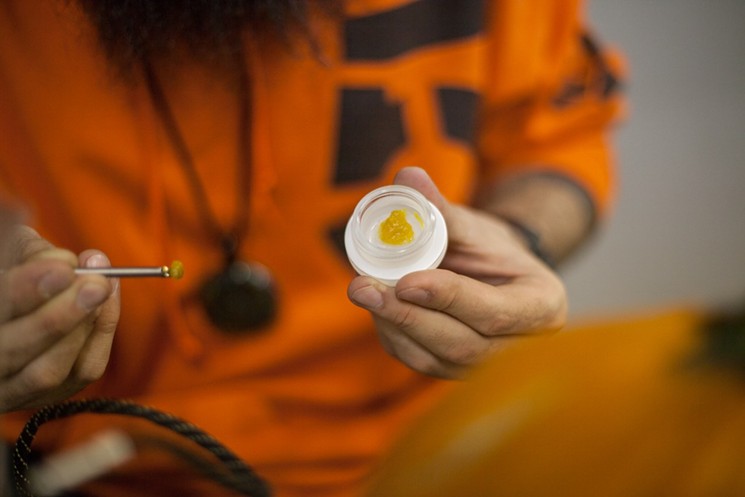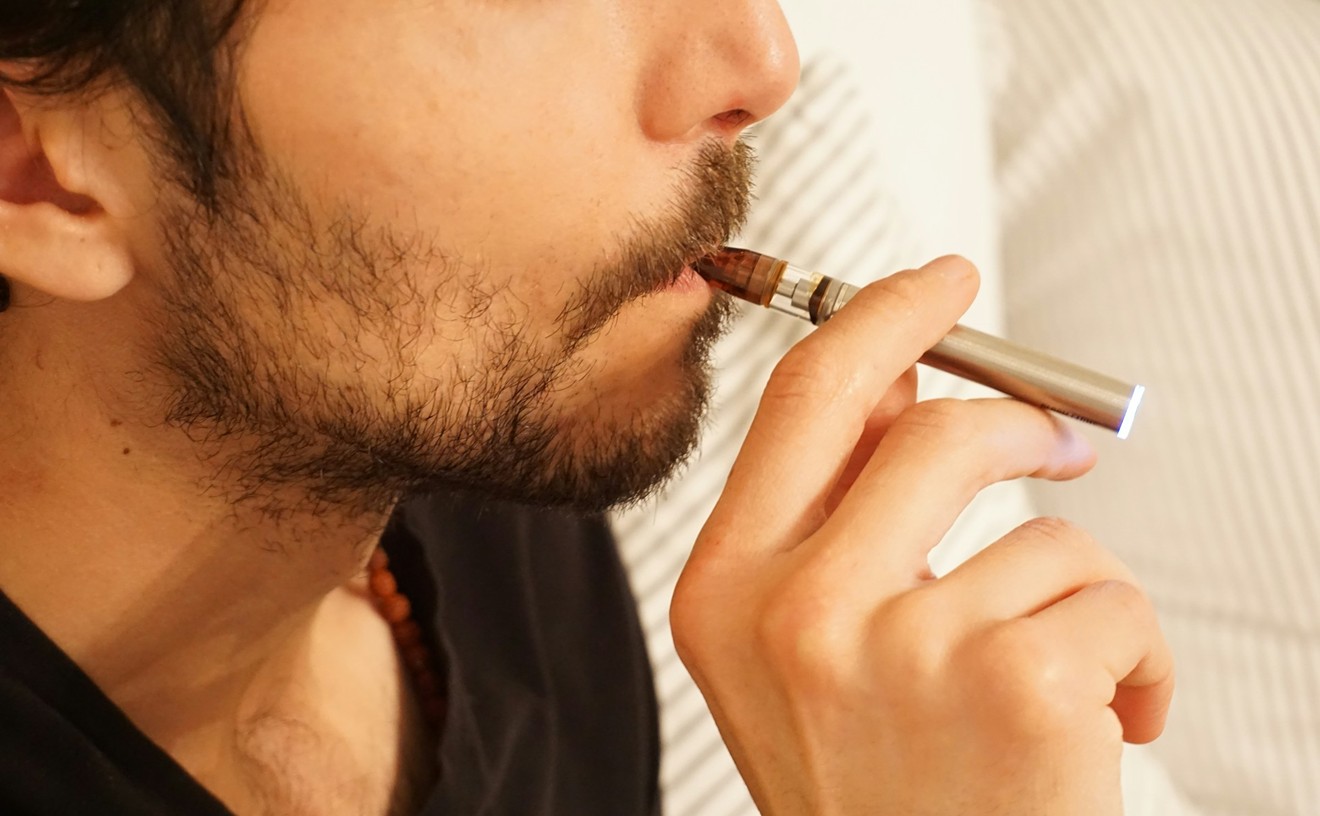Nearly a decade after voters approved legalizing recreational cannabis in 2012, lawmakers are still tinkering with Colorado's marijuana laws.
Ten bills that directly addressed the state's marijuana and hemp laws and regulations were introduced in this year's legislative session, and eight of them passed. While some involved nitpicky technical details, Colorado's medical marijuana program, possession limit and industry rules all saw big changes in 2021.
The most notable marijuana measure, House Bill 1317, has received the most attention from both sides of the legalization debate. Pushed by parents concerned about extracted THC's effects on children, the bill would tighten medical marijuana rules and mandate research into the mental health effects of high-THC marijuana products. Medical marijuana advocates are worried that patient access will decline as a result of the new rules, however, and have called for a veto from Governor Jared Polis, who has yet to announce his stance.
HB 1317 wasn't the only notable measure approved by lawmakers this year. Through other bills now signed into law, the state's recreational pot possession limit has doubled, and young medical marijuana patients at school should have easier access to their daily medication. Outdoor marijuana growers will also be operating under new guidelines.
Here's a roundup of the most significant action:
Medical Marijuana Restrictions
Although HB 1317's title is "Regulating Marijuana Concentrate," the bill's biggest impact could be on the state's Medical Marijuana Registry. The measure calls for several additional layers of protocol for medical marijuana patients and their physicians, including a required THC dosage amount and suggested consumption method, as well as a review of a patient's mental health history before a recommendation is made. There will also be a statewide tracking system for patient purchases, which are capped at 2 ounces of flower or 8 grams of concentrate. The previous daily limit for concentrate, 40 grams, will still apply to homebound and rural patients, and those with proper doctor certification would be allowed to exceed the limits.
New patients between the ages of eighteen and twenty — a contributing factor to youth consumption, in the eyes of the bill's sponsors — would face additional obstacles to obtaining a medical marijuana card, as well as a 2-gram limit on concentrate purchases per day. Doctors recommending medical marijuana would be limited within their respective scopes of practice, which could also reduce patient access, according to bill opponents.
Studies on Mental Health
Another hefty portion of HB 1317 calls for research into THC's impact on mental health. Under the proposal, $3 million would go to the Colorado School of Public Health for an educational campaign about youth use and extracted THC. Another $1 million would be earmarked annually through fiscal year 2023-’24 for a CSPH review of existing research and further study of the mental health effects of marijuana.
In another $1.7 million project, coroners would annually report the results of THC toxicology screens in suicide, overdose and accidental deaths for people under the age of 26 to the Colorado Violent Death Reporting System.
Concentrate Packaging
The language in HB 1317's title regarding packaging is light compared to the bill's portions on mental health research and medical marijuana, but impactful just the same. Under the bill as passed, all marijuana concentrate products, both medical and recreational, would fall under new packaging or labeling rules created by the state Marijuana Enforcement Division in 2023. New labeling requirements or photo instruction on packaging have been floated as possible alternatives, with more printed warnings about high-potency THC products also likely.
Cannabis Farming Updates
Another marijuana bill introduced late in the legislative session, House Bill 1301 brought a handful of changes to outdoor growing for both marijuana and hemp farmers. A portion of the proposal would allow outdoor cannabis growers to create a contingency plan to prevent crop loss during extreme weather conditions, with the new practices created and enforced by the MED.
Bill language creating working groups to reduce cross-pollination between marijuana and hemp plants was more controversial among cannabis farmers. Although marijuana and hemp are regulated and grown differently, they can cross-pollinate miles away from each other when grown outdoors. Cannabis grown for THC and CBD content is feminized and seedless, but industrial hemp grown for fiber carries seeds and pollen. This can pollinate seedless cannabis plants, including hemp, leading to crop loss for some farmers. A large faction of hemp farmers opposes registering farm locations before receiving a license to grow hemp, however, citing preferential treatment and unnecessary obstacles in favor of the marijuana industry.
Polis hasn't signed the bill yet, but is expected to.
Double the Possession Limit
Signed by Polis in May, House Bill 1090 doubles Colorado's recreational marijuana possession limit from 1 to 2 ounces. On top of increasing the current limit, the new law qualifies convictions for up to 2 ounces of pot possession for record-clearing, and wipes out former Class 3 marijuana cultivation felony convictions, as well as charges for growing more than twelve plants but fewer than 25. (Growing more than twelve plants would remain illegal for anyone without a medical marijuana card and extended plant count, however.)
Former offenders would have to apply to the courts themselves, and approval from district attorneys, a common stipulation in record-clearing for other crimes, would not be required. The new marijuana possession limit wouldn't affect Colorado's daily dispensary purchasing limit of 1 ounce as it currently stands, because that would require a regulatory change by the MED.
A 2020 law grants Colorado governors the power to pardon past convictions for up to 2 ounces of marijuana. Polis granted over 2,700 pardons last year, but only for 1-ounce convictions, citing Colorado's adult-use possession limit at the time. Since HB 1090 has passed, Polis has said he will pardon 2-ounce convictions, as well.
Medical Marijuana at Schools for Child Patients
An effort several years in the making, Senate Bill 56, signed by Polis in May, allows school personnel to administer medical marijuana to child patients. That had technically been legal since 2019, but school districts could still decide to ban the medication if they decided to; under that provision, the vast majority of school districts either banned or chose not to address the law, forcing a child's caregiver — usually the patient's parent — to come to school every time a student needed medical marijuana medication. The new law requires school boards to implement policies allowing for the storage, possession and administration of medical marijuana by school personnel and "protects those who do from retaliation," it states.
New Social Equity Entrepreneur Fund
Passed early in the session and signed by Polis in March, Senate Bill 111 was largely negotiated between lawmakers and the Governor's Office in a legislative budget committee meeting before the Colorado General Assembly convened. The bill creates a new Cannabis Advancement Program overseen by the state Office of Economic Development and International Trade, with $4 million in loans, grants and technical assistance to be available for marijuana business applicants qualifying for a social equity program.
Intended to aid communities impacted by the War on Drugs, the program will be available to business owners that can prove one of the following: They or their families were negatively impacted by the War on Drugs, they earn less than 50 percent of the state median income, or they come from a community designated as a low-economic opportunity zone by OEDIT.
[
{
"name": "Air - MediumRectangle - Inline Content - Mobile Display Size",
"component": "12017618",
"insertPoint": "2",
"requiredCountToDisplay": "2"
},{
"name": "Editor Picks",
"component": "17242653",
"insertPoint": "4",
"requiredCountToDisplay": "1"
},{
"name": "Inline Links",
"component": "18838239",
"insertPoint": "8th",
"startingPoint": 8,
"requiredCountToDisplay": "7",
"maxInsertions": 25
},{
"name": "Air - MediumRectangle - Combo - Inline Content",
"component": "17261320",
"insertPoint": "8th",
"startingPoint": 8,
"requiredCountToDisplay": "7",
"maxInsertions": 25
},{
"name": "Inline Links",
"component": "18838239",
"insertPoint": "8th",
"startingPoint": 12,
"requiredCountToDisplay": "11",
"maxInsertions": 25
},{
"name": "Air - Leaderboard Tower - Combo - Inline Content",
"component": "17261321",
"insertPoint": "8th",
"startingPoint": 12,
"requiredCountToDisplay": "11",
"maxInsertions": 25
}
]













